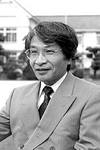 |
|
 |

 |
 The contents here are partially modified from a newspaper article issued in March 2002.
The contents here are partially modified from a newspaper article issued in March 2002. |

| Yamada: |
I recommend that businesses change their mindsets, which have thus far given the highest priority to profits, so as to create points of contact with children. When producing goods or providing services, if children are in the offices, businesses would give more consideration into the way children look at things. At present, when a business claims that it has developed goods with children in mind, it simply means that children are targeted as consumers. Instead, a business might think about what its provision of goods and services for society has on children. If so, for example, when creating video games, a maker will develop software that focuses more on the educational aspects. Convenience stores would stop displaying adult magazines at the eye level of children.
|
Ogi: |
Indeed. Due to their strong profit orientation, businesses have grown much too prone to somehow neglect issues that require more care. Then, what do you think should be done specifically to admit children to a corporate environment.
|
Yamada: |
It is desirable to give children jobs that offer challenges and satisfy them with a sense of accomplishment. Of course, adults should support them so that the jobs are real.
|
Ogi: |
So, it is not simply "making believe" but actually working together. When goods are sold and a customer shows gratitude for their usefulness, children must have great pleasure. They will have confidence that they also could receive fair recognition by society.
|
Yamada: |
In Hyogo Prefecture, they have a very interesting and successful project called "Try-Yaru Week (Make, Try, and Do Week)" through which children participate in society's institutions. My company provides "The Echo-School" and "The Bee Classroom" for local children, and also implements a tree planting campaign in cooperation with local residents in order to turn the area surrounding our corporate buildings into a forest. These activities are conducted at a level different from daily business activity. What's more, I want to take a step forward so that children are involved in daily business activity.
|
Ogi: |
Conventional corporate philanthropic activities carried out by businesses is often withdrawn if business profits decrease, as it is deeply related to corporate profits. But, if a business intends, as you recommend, to maintain a point of contact with children apart from their pursuit of profits, the world around us will change significantly.
|
Yamada: |
In my view, introducing relationships between businesses and children means establishing relationships in society between adults and children.
|
Ogi: |
I thought that parents, being freed from companies for which they work, could have many more points of contact with their children, following the introduction of a five-day school week that will allow their children to enjoy two days off a week. However, it is more desirable that Japan becomes a country that is aware of the value of relationships between businesses and children. In that case, children can imagine clearly what adult society is, including parents at work in businesses as well as people in a community. Accordingly, children will be able to more easily imagine how they will live or how their careers will progress.
|
Yamada: |
When a graduate is employed by a company, he or she can expect support from the company for a while, for example, spending a six-month training period or working as a rookie for three years. Nonetheless, with such a system, there are no problems for business activity. If children were admitted to companies for a number of days each month, the companies must be able to handle them. All that is required of businesses is that they change their mind-sets and prepare a system to accept children. Although a business might lose something, I am not too worried about it because what it gains from such activities should surpass its losses. As a representative of a business based on agriculture, I would like to more actively apply the wisdom preserved in agriculture society concerning child raising to the current world around us. With this view, I appreciate your valuable opinions today. Thank you very much, Mr. Ogi.
|
|
|

|
Naoki Ogi
(Education Critic and Head of Clinical Education Institute "Niji [Rainbow]")
Born in 1947. Graduated from Waseda University and pursued educational practices for 22 years as a teacher in the Kaijyo High School and public junior high schools established by Tokyo Pref. Currently, Mr. Ogi is further pursuing his mission, delivering lectures, appearing on TV, writing for magazines and newspapers, and occupying the position of an executive director of the Japanese Society for the Study on Teacher Education as well as a vice chairman of the Committee on Broadcast and Juveniles (established by NHK and the National Association of Commercial Broadcasters in Japan). He also is an author of several books, including "Kodomo-no Kiki-wo Dou-Miruka (How to Deal with Children Crises)," Iwanami paperback pocket edition; "Gakko-wa Saisei Dekiruka (Can Schools be Revitalized?" NHK Books; "Gakkyu Houkai-wo Dou-Miruka (How to Deal with Breakdown in the Classroom)," Ibid.; and "Gakuryoku Teika-wo Dou-Miruka (How to Deal with Decline in Academic Achievement)," Ibid. |


|
 |



